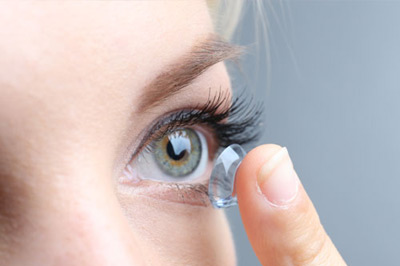
Contact lenses are thin, curved plastic disks designed to cover the cornea; the clear front covering of the eye. Contact lenses provide a safe and effective way to correct vision when used with care and proper supervision. They can offer a good alternative to eyeglasses depending on your eyes and lifestyle.
Types of contact lenses:
- Daily-wear soft lenses
- Disposable Contact lenses
- Leave-in (extended wear) Contact lenses
- Toric Contact lenses
- Rigid gas Permeable Contact lenses
- Bifocal & Multifocal Contact lenses
- Colour Contact lenses
- Prosthetic Contact lenses
- Specialty Contact lenses (Rose K Lens)
- Scleral Contact lenses
Tips:
- Never wear lenses longer than prescribed
- Do not wear daily lenses while sleeping
- Do not wear your lenses overnight unless recommended by your contact lens practitioner. Overnight wear of contact lenses increases the risk of complications.
- Always wash, rinse, and dry your hands before handling lenses. Avoid pump and moisturizing soap and use lint free cotton towels and tissues.
- Do not use saliva to wet your lenses. Do not put lenses in your mouth.
- Use only approved contact lens solutions for lubricating or wetting your lenses.
- Always use fresh solution in your lens case when disinfecting your lenses.
- Ask your contact lens practitioner about wearing lenses during water activities and other sports. In some cases alternative lenses may be prescribed for sport, other hobbies and specific work related activities.
- Schedule and keep follow-up appointments with your contact lens practitioner.
- Never use non-sterile home-prepared saline. The use of home-prepared saline with contact lenses has been associated with serious infections.
- Contact lens storage cases can be a source of bacteria and other microbial growth. Lens cases should be cleaned, rinsed and allowed to air dry each time the lenses are removed. Replace the lens case frequently.
- If your eyes become red, irritated, painful, abnormally light sensitive or if your vision worsens while wearing lenses immediately remove the lens and consult a contact lens practitioner.
- Do not get lotions, creams, sprays or chemicals in your eyes or on your lenses. It is best to insert lenses before applying make-up and remove them before removing make-up. Water- based and gel-based cosmetics are less likely to damage lenses than oil-based products. Do not apply eyeliner on the inside rim of the eyelids.
- You should have eye examinations every 6 x to 12 months or as recommended by your contact lens practitioner.
- Contact lenses wear out with time and should be replaced regularly.
- Disposable lenses should be thrown away after the recommended wearing period prescribed by your contact lens practitioner.
- Daily disposable lenses should not be re-used